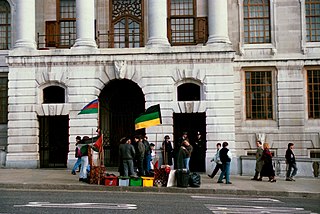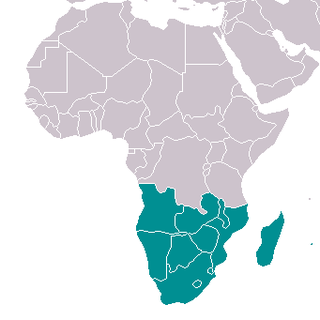
United Nations Security Council resolution 591, adopted unanimously on 28 November 1986, after recalling resolutions 418 (1977), 421 (1977), 473 (1980) and 558 (1984), the Council strengthened the mandatory arms embargo against apartheid South Africa imposed by Resolution 418, and made it more comprehensive. Resolution 591 sought to clarify vague terms from previous resolutions on the topic.

United Nations Security Council Resolution 402, adopted on December 22, 1976, after hearing from the Minister of Foreign Affairs for Lesotho, the Council expressed concern at South Africa's decision to close the border with Lesotho in many areas in an attempt to pressure the country to recognise the "independence" of the bantustan Transkei. After recalling previous resolutions, the Council praised Lesotho for not recognising Transkei and stated it will organise economic assistance to the country from the organisation itself and other countries to help it overcome the blockade by South Africa.

United Nations Security Council Resolution 402, adopted on May 25, 1977, after recalling Resolution 402 (1976), the Council noted with concern the continued harassment of the people of Lesotho by South Africa in violation of the resolution. It also recognised the burden that had been placed upon Lesotho with regard to its decision not to recognise the "independent" bantustan Transkei by South Africa.

In United Nations Security Council Resolution 417, adopted on October 31, 1977, after reaffirming Resolution 392 (1976), the Council condemned the continuing repression against black people and other opponents of apartheid, as well as the South African media and the mounting deaths of detainees. The Council foresaw that the continuation of such activities would lead to serious racial conflict with international repercussions.

United Nations Security Council Resolution 428, adopted unanimously on May 6, 1978, after hearing representations from the People's Republic of Angola, Zambia and the South West Africa People's Organisation (SWAPO), the Council reminded Member States to refrain from using threats and use of force in their international relations. Reiterating Resolution 387 (1976), the present resolution condemned South Africa for its armed invasion of Angola via South West Africa (Namibia).

United Nations Security Council resolution 473, adopted unanimously on 13 June 1980, after recalling resolutions 392 (1976), 417 (1977), 418 (1977), 454 (1979) and 466 (1980) and letters from the Committee for South Africa, the council expressed its concern and condemned South Africa for the killing of protesters, including schoolchildren, opposed to apartheid.

United Nations Security Council resolution 503, adopted unanimously on 9 April 1982, after reaffirming Resolution 473 (1980), the Council expressed its concern at the death sentences issued by the Transvaal Provincial Division of the Supreme Court of South Africa against Ncimbithi Johnson Lubisi, Petrus Tsepo Mashigo and Naphtali Manana, all of whom were members of the African National Congress.

United Nations Security Council resolution 525, adopted unanimously on 7 December 1982, after hearing of the death sentences on Anthony Tsotsobe, Johannes Shabangu and David Moise, the Council expressed its concern at the sentences passed by the Supreme Court of Appeal of South Africa, in addition to those of Ncimbithi Johnson Lubisi, Petrus Tsepo Mashigo and Naphtali Manana, members of the African National Congress.

United Nations Security Council resolution 527, adopted unanimously on 15 December 1982, having heard representations from Moshoeshoe II of Lesotho, the Council condemned, alongside a General Assembly resolution, an attack by South Africa on Lesotho, resulting in damage and the deaths of 40 people.

United Nations Security Council resolution 554, adopted on 17 August 1984, after recalling 473 (1980), the Council condemned the 1984 general election in South Africa and the adoption of the Constitution of the Republic of South Africa Act.

United Nations Security Council resolution 556, adopted on 23 October 1984, after recalling 554 (1984) and the Universal Declaration of Human Rights, the Council expressed its alarm at the killing of anti-apartheid demonstrators in South Africa, reaffirming that the country's disregard for world opinion will lead to a further escalation of the "explosive situation".

United Nations Security Council resolution 560, adopted unanimously on 12 March 1985, after recalling resolutions 473 (1980), 554 (1984) and 556 (1984), the council condemned the continuing repression of anti-apartheid activities in South Africa, noting that the repression would undermine the possibility of a peaceful solution.

United Nations Security Council resolution 566, adopted on 19 June 1985, after recalling resolutions 269 (1969), 276 (1970), 301 (1971), 385 (1976), 431 (1978), 432 (1978), 435 (1978), 439 (1978), 532 (1983) and 539 (1983), the Council expressed concern at the tension and instability caused the continued occupation of Namibia by South Africa, noting the apartheid policies implemented in the territory and that the territory was used as a springboard for attacks on other southern African countries.

United Nations Security Council resolution 568, adopted unanimously on 21 June 1985, after hearing representations from Botswana, the Council condemned the Raid on Gaborone by South Africa, expressing its shock and indignation at the loss of life and damage to property and considered the attack as a "gross violation of the country's sovereignty and territorial integrity".

United Nations Security Council resolution 568, adopted on 26 July 1985, after expressing its outrage and concern at the suffering caused by the apartheid system in South Africa, the Council further condemned the repressive policies of the apartheid system including murders and forced removals, as well as the state of emergency imposed in 36 districts in the country, demanding it be lifted immediately.

United Nations Security Council resolution 580, adopted unanimously on 30 December 1985, having heard representations from Lesotho and recalling Resolution 527 (1982), the Council condemned the recent attacks on the Kingdom of Lesotho by South Africa, resulting in loss of life and damage to property on 19 December, in which several South African refugees were murdered in Lesotho's capital Maseru by the South African Defence Force.

United Nations Security Council resolution 581, adopted on 13 February 1986, after hearing representations from Sudan and the front-line states and reaffirming resolutions 567 (1985), 568 (1985), 571 (1985), 572 (1985) and 580 (1985), the Council strongly condemned "racist South Africa" for its recent threats to perpetrate acts of aggression against neighbouring countries in southern Africa.

United Nations Security Council resolution 610, adopted unanimously on 16 March 1988, after reaffirming resolutions 503 (1982), 525 (1982), 533 (1983) and 547 (1984) expressing concern at the imposed death sentences of anti-apartheid activists, the Council noted the deteriorating situation in South Africa. Resolution 610 concerned the Sharpeville Six, accused of the murder of the Deputy Mayor of Sharpeville on 12 December 1985.

In United Nations Security Council resolution 615, adopted unanimously on 17 June 1988, after reaffirming resolutions 503 (1982), 525 (1982), 533 (1983), 547 (1984) and 610 (1988) expressing concern at the imposed death sentences of anti-apartheid activists, the Council noted the deteriorating situation in South Africa.

United Nations Security Council resolution 919, adopted unanimously on 25 May 1994, after recalling all resolutions on South Africa, in particular resolutions 282 (1970), 418 (1977), 421 (1977), 558 (1984) and 591 (1986), the Council welcomed the recent general elections and new government and decided, under Chapter VII of the United Nations Charter, to terminate the arms embargo and all other restrictions against South Africa.












